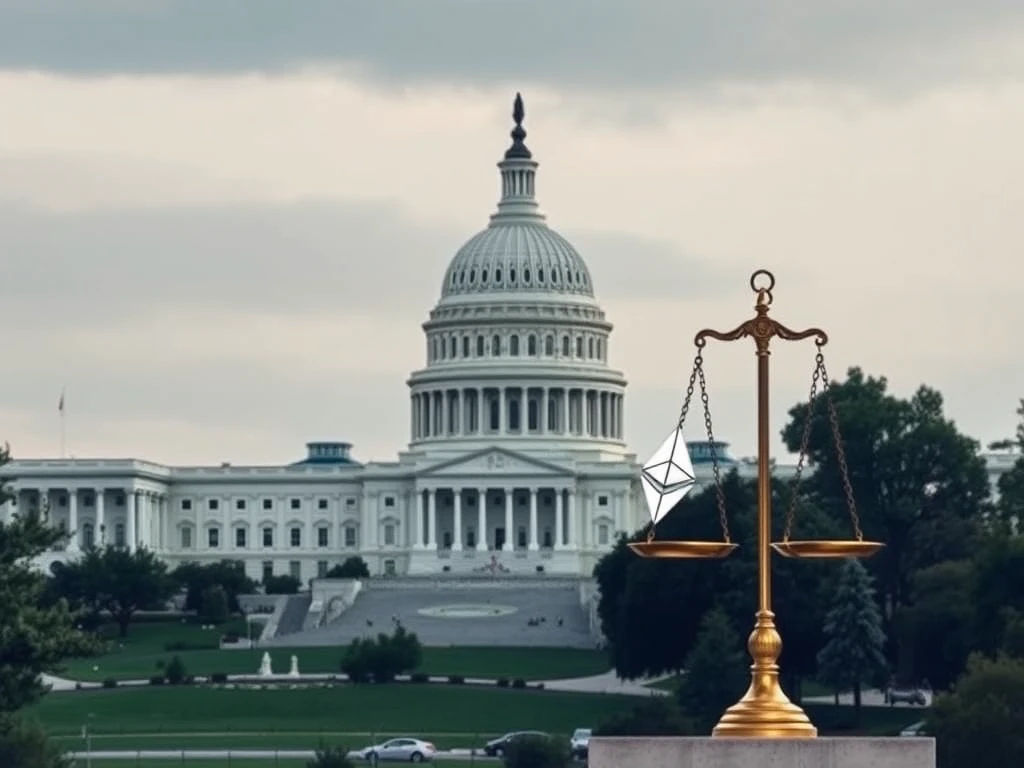US Crypto Bill: New Draft Aims to Curb Big Firm Power

Hey crypto enthusiasts! Have you heard about the latest buzz from Capitol Hill? A new US crypto bill draft is making waves, and it could significantly change how big players operate in the market. Let’s dive into what this potential legislation means for you and the future of digital assets.
Understanding the New US Crypto Bill Draft
House Republicans recently introduced the “Digital Asset Market Structure Discussion Draft.” This isn’t entirely new; it’s a revised version of the previous FIT21 Act. But this update includes some key changes aimed at leveling the playing field in the crypto space.
One of the most discussed changes involves defining who is considered an “affiliated person.” Under the new draft, anyone owning more than 1% of a digital commodity’s total supply is considered affiliated. This is a significant drop from the 5% threshold in the earlier FIT21 bill. Why does this matter? According to experts like Justin Slaughter from Paradigm, this lower threshold could:
- Curb the influence of large crypto firms.
- Encourage broader market participation.
- Promote a more ‘democratized’ crypto environment.
The draft also attempts to clarify what constitutes a “mature blockchain system,” defining it as one not under the “common control” of a single person or group.
Navigating US Crypto Regulation: SEC and CFTC Roles
Regulatory clarity is something the crypto industry has long called for, and this draft attempts to address it. Here’s a look at the proposed roles:
- The SEC would oversee crypto networks until they are deemed sufficiently decentralized.
- Protocols enabling self-directed financial transactions (like many DeFi platforms) could be exempt from registering as brokers or dealers.
- Digital commodities are referred to as “investment contract assets,” distinguishing them from traditional securities under the Howey test.
The bill suggests that securities laws wouldn’t apply to secondary token sales unless they transfer ownership or profit in the underlying business. Importantly, it aims to provide a clear path for crypto firms to raise funds under SEC oversight while also registering digital commodities with the CFTC.
Joint rulemaking between the SEC and CFTC would be required for handling registered assets that no longer comply with regulations, including delisting procedures.
Pushing for Regulatory Clarity in Digital Assets
House committee members argue that clear rules are crucial for advancing innovation and reinforcing US dollar dominance in the digital age. They’ve criticized the previous approach of “regulation-by-enforcement” used by the SEC under Gary Gensler, which they say left many firms in “legal limbo” and pushed some overseas.
The sentiment from proponents is clear: America needs a “commonsense regulatory regime” to be a leader in digital asset investment and innovation. This draft is presented as the potential answer to provide that much-needed clarity.
Challenges Ahead for the US Crypto Bill
While the draft is a step towards a structured regulatory framework, it’s not without opposition. Reports indicate that House Financial Services Committee Ranking Member Maxine Waters plans to block related events, highlighting the political hurdles this Republican-led initiative faces. Achieving bipartisan agreement on comprehensive crypto regulation remains a significant challenge.
Summary
The new US crypto bill draft represents a notable effort by House Republicans to establish a clear regulatory framework for digital assets. By proposing a lower threshold for identifying affiliated persons and clarifying the roles of the SEC and CFTC, the bill aims to curb the influence of large firms, promote wider participation, and end the uncertainty faced by many in the industry. However, like much crypto legislation, it faces political resistance, meaning its path to becoming law is far from certain.







